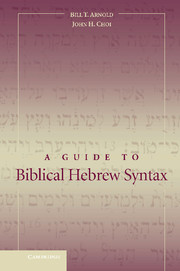3 - VERBS
Published online by Cambridge University Press: 05 June 2012
Summary
Biblical Hebrew has no tenses in the strict sense of the term. By this statement, we mean that Hebrew does not locate an action or state in time by means of specific morphology. Of course, this does not mean that Hebrew fails to express time relations entirely, only that it does so through a variety of syntactical and contextual features, rather than through verbal inflections or grammatically realized tenses.
Rather than a morphologically precise tense system, Hebrew uses an aspect system to indicate first, the contour of a situation in time, and second, the type of action. The first grammatical category (Aspekt) identifies the action as either undefined or progressive (“perfect” or “imperfect”). The second category (Aktionsart) refers to the type of action with regard to voice, fientivity, transitivity, causation, and various reflexive actions. The latter (Aktionsart) is marked by verbal stems, the former (Aspekt) by verbal conjugations.
Stem
In general, the Qal and Niphal have no element of causation in their predication, in distinction to the other stems. The Piel, Pual, and Hithpael have “causation with a patiency nuance,” and the Hiphil and Hophal represent “causation notion with an agency nuance.”
Qal (the G stem)
The Qal is the “simple active” stem. The voice of the primary subject is active (see vertical axis of the appendixes). Since there is no element of causation, the Qal has no secondary subject (first column of the horizontal axis of Appendix II). Hence, the stem is “simple.
- Type
- Chapter
- Information
- A Guide to Biblical Hebrew Syntax , pp. 36 - 94Publisher: Cambridge University PressPrint publication year: 2003



